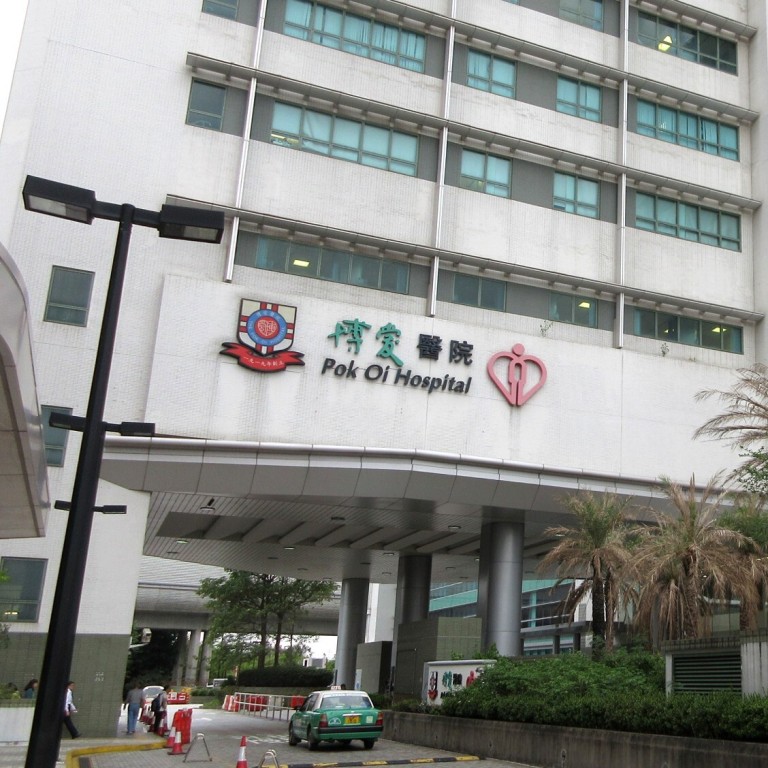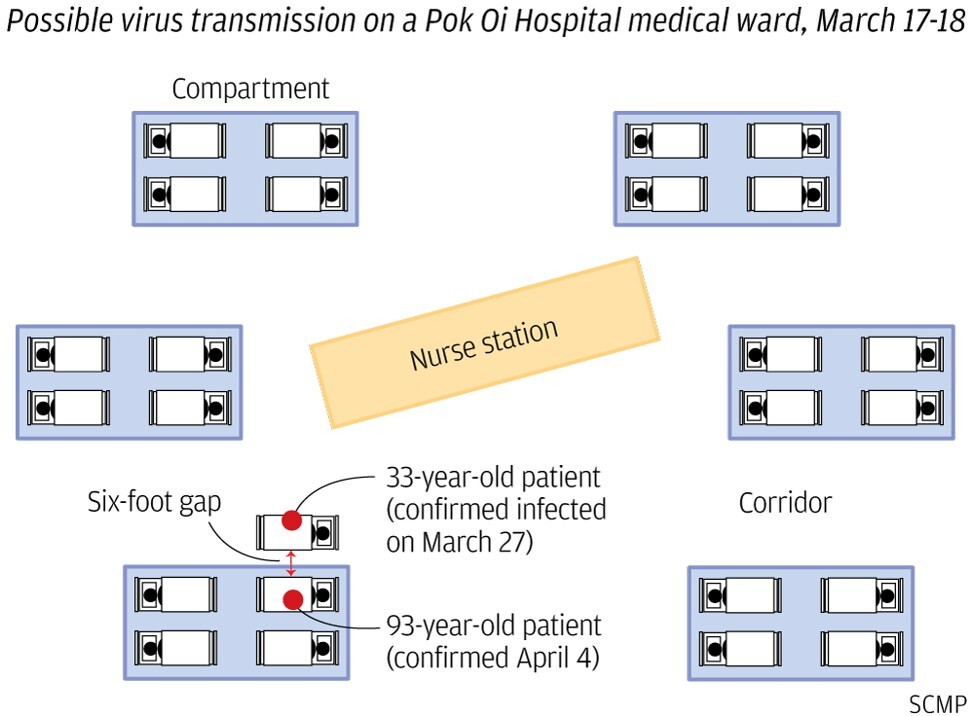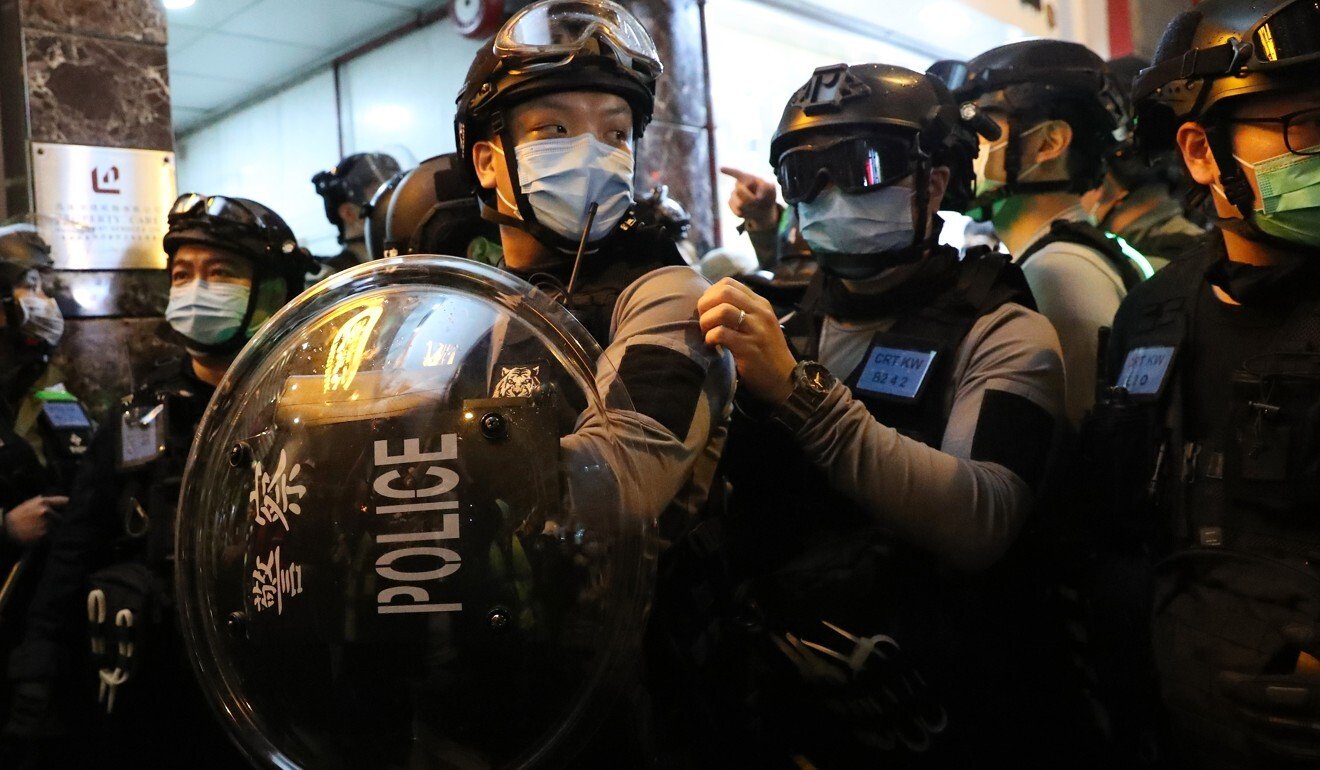
Coronavirus: Hong Kong investigates possible hospital spread, as 17 new cases take city total to 863
- Stroke patient, 93, who spent nearly a month from March 10 in Pok Oi Hospital, among 17 new infections taking city total to 863
- Some 225 patients and health workers sent to isolation or undergoing tests
Health authorities are investigating Hong Kong’s first case of possible coronavirus transmission in a public hospital after an elderly stroke patient was infected during his stay, as the city confirmed 17 new cases on Saturday, taking its total to 863.
Fearing a devastating spread through Pok Oi Hospital in Yuen Long, officials have locked down the two wards where the 93-year-old was treated and suspended services, while 225 patients and health workers have been sent into isolation or will undergo tests.
Preliminary findings from leading microbiologist Professor Yuen Kwok-yung and the Department of Health revealed the stroke survivor was on a ward near to another man later confirmed as infected.
“We have reasons to believe that the elderly man’s infection is linked to this young man, but we will still investigate whether the 93-year-old man had other relevant contacts,” Yuen told the media outside the hospital.
A riot police officer involved in a clearance operation at Hong Kong’s Prince Edward MTR station earlier this week was also confirmed as infected on Saturday.
Of the 17 new cases – the lowest daily tally since March 21 – 10 had travel history, including seven students returning from abroad. Two of the seven local infections were linked to bars in Wan Chai and Tsim Sha Tsui.
Jobs destroyed worldwide as coronavirus sparks recession prospects
The 93-year-old stroke patient stayed from March 10 on medicine and geriatric wards on the fifth and eighth floors of Pok Oi Hospital.
He was discharged on Wednesday, but was found to be infected when he returned on Friday with a fever, vomiting and lung issues. His condition is now described as serious.

A 33-year-old man returning from Europe, who at first tested negative for the virus, was admitted on March 17 to one of those wards with high blood pressure, Yuen said. But the younger man, who was on a bed in a corridor six feet from the 93-year-old’s compartment, returned a positive reading on March 27.
A Hospital Authority spokesman said: “The patient had been staying in hospital for most of the time during the incubation period. Pok Oi Hospital is working closely with the Centre for Health Protection and infectious disease experts to identify the possible source of infection.”
As of Saturday night, 74 patients at Pok Oi Hospital aged between 21 to 90, were in compulsory isolation in wards, which would last until testing proved they were not infected, while 150 medical staff must undergo checks, according to the hospital’s spokesman.
A nurse from the hospital who visited the elderly man’s home on Thursday was identified as one of his close contacts and will be sent to a quarantine facility.
Jobs destroyed worldwide as coronavirus sparks recession prospects
Yuen said: “We will take samples from all medical staff and patients with links to the elderly man, and the wards will suspend services.”
“All patients cannot leave the ward until all of the cases test negative. We have to ensure there is no transmission chain within the hospital.”
He added: “Visitors and medical staff may all have had contact with him, and it is possible that the virus will spread. All of his family members have to be isolated and tested as well.”
The suspected hospital transmission raised fears of a repeat of the large-scale outbreak during 2003’s severe acute respiratory syndrome (Sars) crisis in ward 8A of Prince of Wales Hospital in Sha Tin, in which a patient infected 11 health care staff before it spread to a total of 137 people.
Yuen said while a few Pok Oi staff and patients “might still have a chance of infection” neither of the infected two were using breathing apparatus that had previously characterised large-scale transmissions in hospitals.
Doing time in Hong Kong’s prison-like coronavirus quarantine camps
Dr Leung Chi-chiu, chairman of the advisory committee on communicable diseases at the Hong Kong Medical Association, said the case of the 33-year-old Pok Oi patient, who had been abroad, had exposed the phenomenon of “false negative” tests.
“Although their first tests have shown negative, those returning from high-risk regions overseas and with symptoms still carry a risk of infection,” Leung said. “They should be put into isolation wards until the second test shows another negative.”
Meanwhile, the death of a young woman under home quarantine emerged on Saturday but the authorities said preliminary coronavirus tests were negative. She returned from Denmark in mid-March and had been staying at home after her mandatory isolation ended.

A 46-year-old police sergeant in West Kowloon region was also among Saturday’s new cases.
Chuang said he last worked on Tuesday and was based at Shek Kip Mei Police Station, the workplace of an officer previously found with the virus.
A police source familiar with the situation said the sergeant was deployed to disperse crowds around Prince Edward station on Tuesday night when supporters gathered to mark the seven months since clashes there between officers and anti-government protesters.
The source said the sergeant wore a mask throughout and did not make any arrests or have any contact with any of the 54 people detained at the police station.
Meanwhile, Dr Owen Tsang Tak-yin, medical director of the Hospital Authority’s Infectious Disease Centre at Princess Margaret Hospital in Kwai Chung, said up to 30 per cent of the city’s infected patients had temporarily lost their sense of smell or taste, which he believed was caused by the coronavirus attacking associated nerves in the body.



